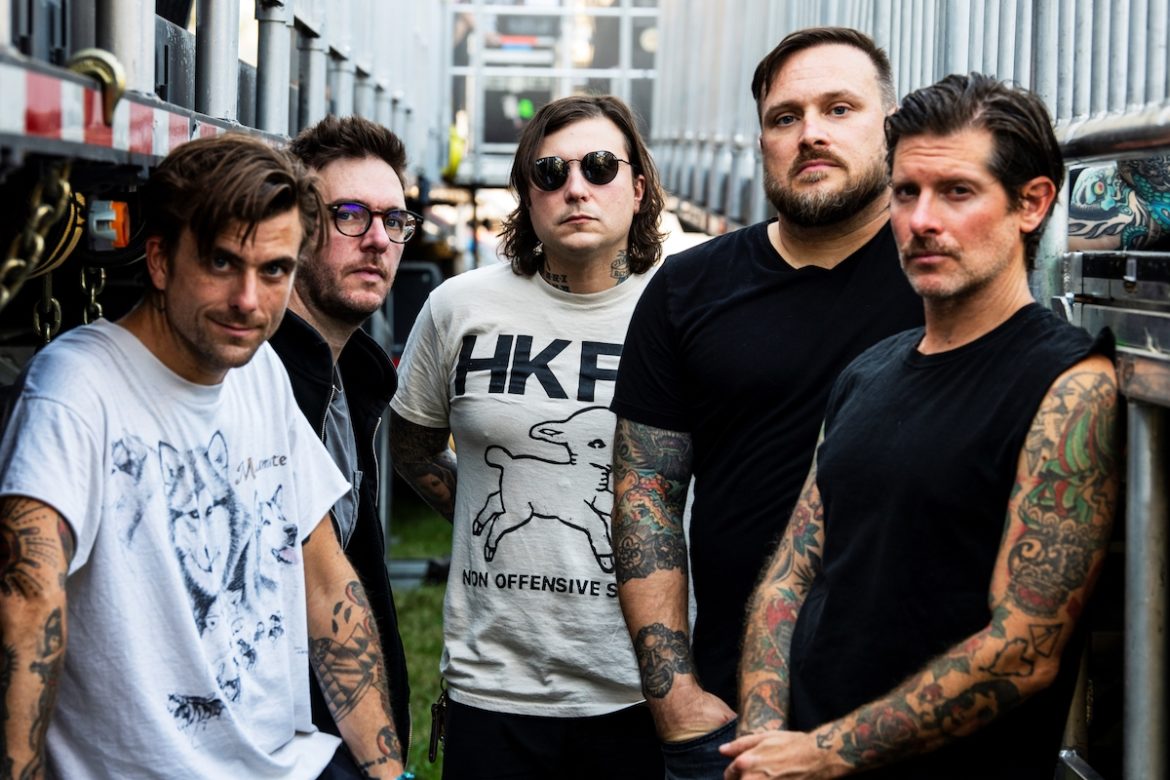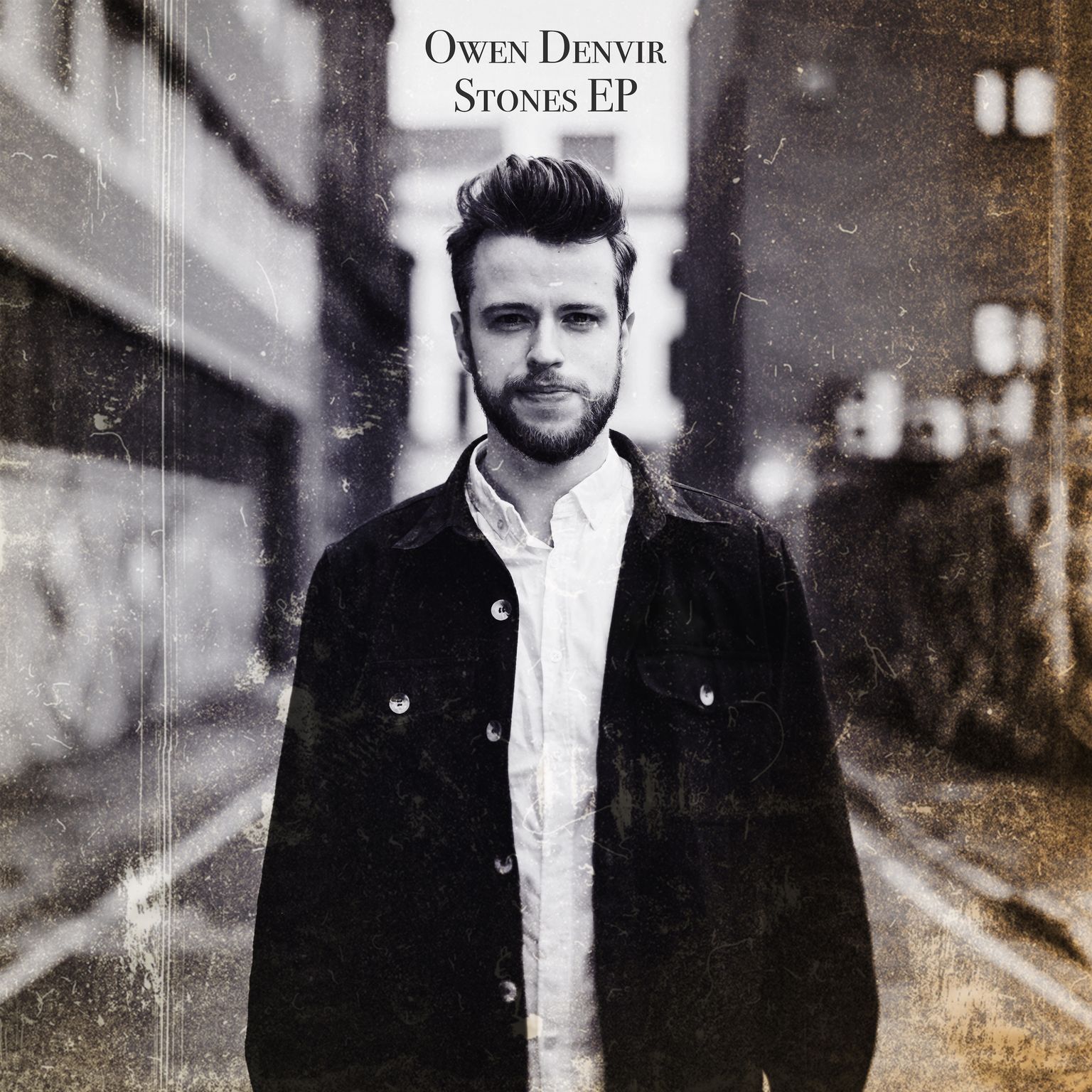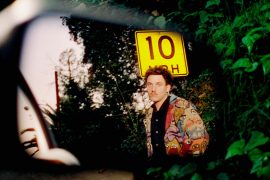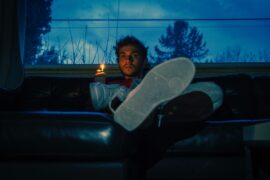Frank Iero and Tucker Rule discuss their new band L.S. Dunes, the state of live music in 2023, and the freedom that’s come from starting over. With members from My Chemical Romance, Coheed and Cambria, Circa Survive, and Thursday, L.S. Dunes is a cross section of the modern rock canon – and five friends having the time of their lives.
Stream: ‘Past Lives’ – L.S. Dunes
We’re from punk rock and hardcore. It’s DIY; it’s making something out of nothing. You’re being told that your industry is dead and you should go work for Amazon, so what do we do against all odds? Start another band. Punk is punk.
The end of 2022 year brought us an incredible development in rock and hardcore music, by the name of L.S. Dunes: A supergroup so unlikely, yet so obvious, that as we struggle to comprehend their very existence, we also can’t help but wonder why it took them this long to get together.
Comprised of My Chemical Romance’s Frank Iero (guitar), Coheed and Cambria’s Travis Stever (guitar), Circa Survive’s Anthony Green (vocals), Thursday’s Tim Payne (bass) and Tucker Rule (drums), L.S. Dunes are a cross section of the modern rock canon, each of its members a seasoned professional and master of his craft.
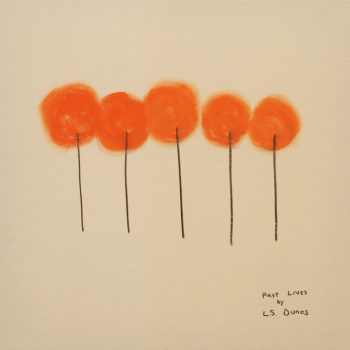
After forming virtually during the height of the COVID-19 pandemic and recording largely in their own makeshift home studios over the past two years, L.S. Dunes arrived this past August in a maelstrom of surging guitars, searing drums, and feverish, fiery vocals.
Debut single “Permanent Rebellion” represented the start of something very special, itself an unapologetic uproar of passion, polish, and pure energy channeled through a volatile volcanic eruption of sonic fury. It’s a stunning, hard-hitting post-hardcore song that all-too-perfectly blends alt-rock and punk with a touch of metal, and just as well: Released in mid-November via Fantasy Records, L.S. Dunes’ debut album Past Lives is sonically supercharged and all-consuming: A cinematic outpouring of raw, radiant music and intense emotional vulnerability.
The Jersey mentality is, you don’t boast about yourself. You don’t complain. You put your head down and you do the goddamn work, because nobody cares. There’s 1000 bands here; we all want it, so you better be really good. Get up there, shut up, and be great.
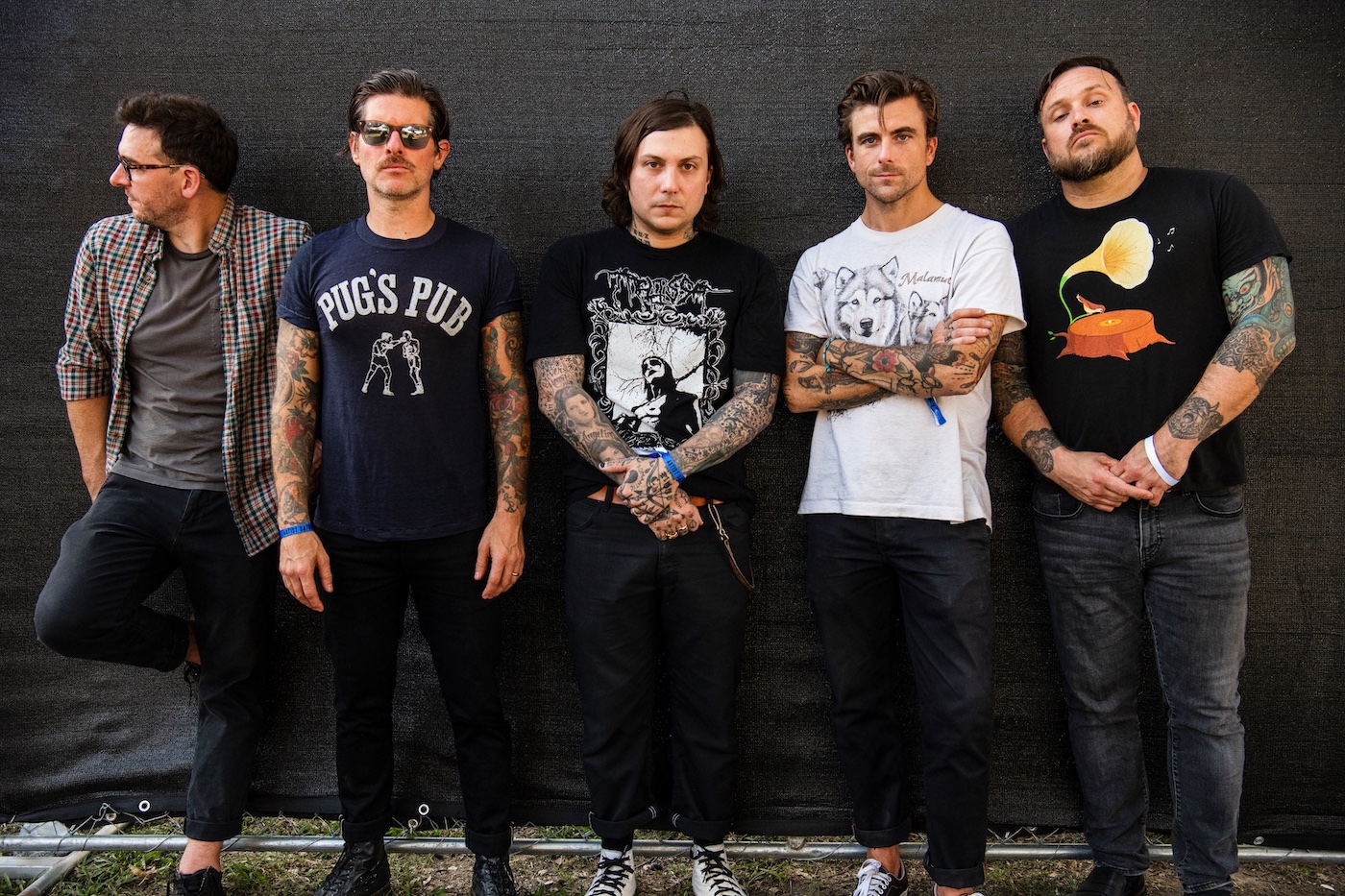
What makes L.S Dunes so exciting is the way they push themselves and their music forward.
“Taking out the ego of everything has been a very important part of this process,” Tucker Rule tells Atwood Magazine.
Rather than resting their laurels on what they know, the five-piece spend their debut album taking risks that pay off big time in the form of explosive, instantly memorable choruses, gut-wrenching lyrics, bold guitar lines, and even bolder drum beats.
“The Jersey mentality is, you don’t boast about yourself, you don’t complain, you put your head down and you do the work,” Frank Iero explains. He and his L.S. Dunes band members certainly put in the work, and the result is a fresh-sounding band whose familiar faces are more than ready (and willing!) to carry a generation’s worth of angst and edge forward and through the 2020s.
Atwood Magazine sat down with Frank Iero and Tucker Rule to dive deep into L.S. Dunes’ music.
Read our interview below for a candid conversation about the band’s origins, the songs on Past Lives, the state of live music in 2023, and the freedom that’s come with starting over.
“It truly is a phenomenal time because we’re just all buds,” Iero says. “We’re all friends, and so that, I think, is the cornerstone of the band. When the band is having a good time, you can tell!”
“You can’t not see how much fun we’re having,” Rule adds. “A good time is infectious, and we’re having the time of our lives. We’re reborn in our 40s musically. This band and this record has made me fall in love with playing music all over again.”
L.S. Dunes are here for a good time, and they’re loving every minute of it. Here’s to hardcore’s newest titans.
The band are currently on tour in Europe. Grab tickets and find more information at lsdunes.com!
People sacrifice quite a lot, and you need to have your head on straight and realize that you do it for you and you do it because you have to. It’s like breathing; you don’t even know why you’re doing it, but you have to in order to survive.
— —
:: stream/purchase L.S. Dunes here ::
Stream: “Permanent Rebellion” – L.S. Dunes
A CONVERSATION WITH L.S. DUNES
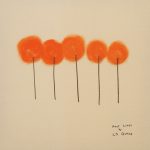
Atwood Magazine: Frank and Tucker, thank you so much for taking the time to speak today! I actually had the pleasure of seeing both of you three times in concert this year, albeit for different bands back in September. I caught My Chemical Romance’s September 10th and 11th shows, and the homecoming show in Newark.
Frank Iero: Oh wow. Those were some good shows, man. I liked those shows.
Everybody was fantastic! There's been an energy in all the concerts I've seen recently, actually. I feel like folks are excited to be back together. The concert industry itself is f--ed, but there's this electricity in the air of coming together.
Frank Iero: Well, I think that’s the thing, right? I mean, when you love something so much, right? It’s human nature to end up taking it for granted ’cause you just feel like it’s always gonna be there. But then when that thing gets taken from you and you don’t know if you’ll ever see it again you have this newfound respect for it, newfound appreciation. And it really does change every second that you’re on that stage. I think collectively, when we were starting Dunes, we had no idea if we would ever play another show.
I mean, honestly, people were dying. They were losing their livelihoods. We were watching our industry crumble. We were the first to be removed from our work and the last to go back. So when you got a bunch of guys that collected, [chuckle] we don’t know how to do anything else. This is all we know how to do. And that’s what… Tucker will always say to me. He’s like, “I don’t understand people that get nervous before shows. Like this is all we know how to do. This is the only thing you’re good at.”
Tucker Rule: Only thing we’re good at, but yeah…
Frank Iero: And then when they tell you, like, “Hey, that thing that you’re good at, get good at something else.”
Tucker Rule: Yeah. Figure it out. It’s crazy. Like two constants in the whole pandemic thing were like Netflix and music. You know what I mean? People had to sit and watch movies and watch shows and people had to listen to music ’cause there was nothing else to do. So we’re supposed to be thriving. However, we can’t go to work. You know what I mean? So it was crazy.
There's something to be said that people keep listening to music; it doesn't matter where they are. At the very least, we had that throughout.
Frank Iero: But in the same breath, you got to understand like, yeah, people are listening to music and they’re listening to recorded music through streaming – and the labels are the first to get paid and the artists are not. The artists are the last ones. The way that we make money is by touring, selling cloth, selling yourselves on stage. So alive and well, it’s alive. Well, we haven’t figured out the faucets yet. You guys get turned on first and we’re still trickled.
You're right to point that out.
Tucker Rule: We’re the invisible people that put your hand under the faucet and the water just never comes out. You know what I mean? Like it doesn’t recognize your hand. So you’re just like, ghost hands and you’re dry and then you just have pee on your hand.
So nice, thanks for that visual. In the exact same breath, you both have gone from not touring at all for two years to going hard into it, beyond the My Chemical Romance and Thursday shows. You recently wrapped up your first L.S. Dunes tour. How has the live reception been to the band?
Frank Iero: I mean, it’s been phenomenal in my aspect of it. I didn’t know what to expect. I think, we all thought there might be some residual trickle in fan base from our collective projects. But that stuff is fleeting. Sometimes it’s real loud online, but it doesn’t translate to shows. This was above and beyond anything that I could have imagined or expected.
Do you feel that folks coming out to these shows were coming to see you for you or you for Tucker Rule of Thursday for Frank Iero of My Chemical Romance, etc?
Tucker Rule: I think that was the gateway drug. You know what I mean? Like the names in the interim were the gateway drug. But I think that like I think the record speaks for itself. You know what I mean? I think that it delivered a little bit of the hype. I would hope it did, you know what I mean? Because I know that we love it so much. So I definitely think like, yes, the names got the people in the door. But we did what we do.
Frank Iero: I think that’s the thing. I’ve seen shows where it’s obvious that people are just waiting for the music to end to get a photo up. You know what I mean? This was not that. This was like everyone knew the words from front to back. Records are selling, but kids already have the record. They know the songs. They’re fans of the band. It was pretty remarkable how the crowds went off. And yeah, I gotta say, like Tucker said, I feel very fortunate. I love the record so much. And I think putting that record out and seeing the reaction just it was even overwhelming. It was even to love it so much, but like, you know your kid’s cute or you think your kid’s cute. Like when you show it up to other people like, oh, yeah, you can tell on their faces like… You know what I mean? If you actually have a cute kid or not or just an ugly baby. This felt like we had a beautiful baby.
Tucker Rule: Beautiful baby. And also you can’t not see how much fun we’re having. You know what I mean? So I think that that kind of shines through a little bit. You know a good time is infectious. And we’re definitely having… I mean, I feel like I could speak for you here, Frank, but I think we’re having the time of our lives. You know what I mean? We’re reborn in our 40s musically. I feel like this band and this record has made me fall in love with playing music all over again. I’ve always been in love with it. But I always say it’s like this. It’s like when you’re driving through somewhere and you see the mountains like in Colorado, say and then people who you’re with are like, Oh, whatever, it’s just the mountains. But you’re just like, “Holy shit.” When you live near the mountains you don’t appreciate them all the time.
Frank Iero: Hard to see the forest for the trees, right?
Tucker Rule: For sure.
For those of us who weren't able to make it out for this first one, what are the hallmarks of an L.S. Dunes' concert?
Frank Iero: The hallmark of an L.S. Dunes show. Well, you got 11 songs. And I think honestly, it goes back to what Tucker just said, it’s enjoyment. I’ve never gotten to play with everybody else in this band. Me and Tucker have played together before. We did… Was it one My Chem tour or two that you came on? Let’s say two.
Tucker Rule: I played one My Chem tour with you and then we did another one Thursday, and you guys.
Frank Iero: Right. Right. But like us playing together on the same band on stage.
Tucker Rule: Oh, yeah. Just one My Chem tour.
Frank Iero: Alright. So we did a My Chem tour together and then we did a Future Violents record together. And then we did a couple of Thursday performances during the pandemic and stuff. And then this live stream stuff. And then this is like another. So I’ve had the opportunity and the pleasure to get to play with Tucker and to know his playing style and getting to write with him is just it’s so easy. He’s the type of musician where he zigs when he’s supposed to zig, he zags when he’s supposed to zag and sometimes he’ll zig when I think he’s gonna zag and it totally makes my brain shit inside my head. And I’m like, “Oh, my God, that’s perfect. We got to exploit that and do that.” He writes hooks all over the drum set. It’s crazy. So I’ve had that experience before and I love it. But I’ve never gotten to play.
Tucker Rule: Thank you.
Frank Iero: You’re welcome. [laughs] I’ve never gotten to play…
Tucker Rule: I mean, the red is this right now.
Frank Iero: Oh, I’ve never got to play with Tim, Travis or Anthony, but we’ve toured together and stuff like that. We’ve known each other in different circles. And it was always one of those things we’re like, “Oh, yeah, yeah, that’d be fun to write together. That’d be fun. We should do this.” But you always say that and it’s something that never comes to fruition, but this was the first time doing that. And I love that this band started like your first high school band. It’s just a bunch of friends. Oh, you happen to play an instrument. You like the same music that I like. Hey, we should start a band. And that’s basically how this started. We enjoyed each other’s company. We already had like a text chain that we would send dumb stuff back and forth, make each other laugh. And it was just like, oh, well, why don’t we do that and also play music while we do it? And that’s what you’re getting. I think you like, we laugh on stage as much as I was many… As many notes as we play, I think is how many laughs are heard.
It’s like, it truly is a phenomenal time because we’re just all buds. We’re all friends, and so that, I think, is the cornerstone of the band. And I think it’s like Tucker said, it’s infectious. I think when the band is having a good time you can tell. It’s just like when you can tell, like a band is fighting or they’re having a really rough time of it. Sometimes that push and pull and that, not the animosity, but the tension can add to the performance. Right. I’ve never enjoyed that too much. I mean, I’ve enjoyed it like watching a fight is enjoyable, you know what I mean?
But ultimately, I don’t feel like I’m invested in it. Right. So I enjoy a band that likes playing with one another. I enjoy a band that has each other’s backs and I enjoy a band that’s having fun doing what they’re doing. ‘Cause if you’re not having fun up there, what the f*** like, I can’t have fun watching you. You know what I mean?
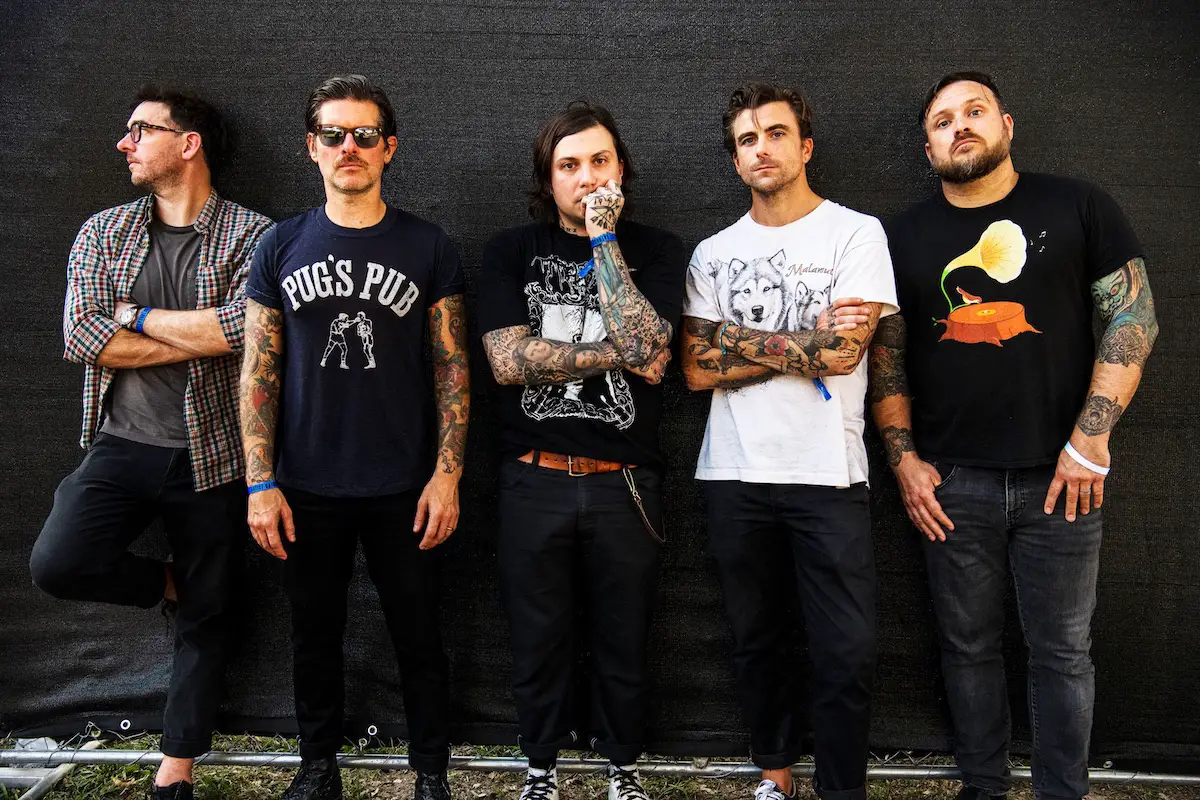
Absolutely. So, we're exactly one month out from Past Lives' release.
Frank Iero: Thank you. You mean like right now, like this moment?
Exactly this moment, yes. What's it been like to have this album out in the world?
Tucker Rule: Dude, it’s been amazing because for so long we did it under the darkness of the cloud. You know what I mean? We couldn’t tell anybody anything. We didn’t tell anybody anything. So when we were first able to talk about it, it was like a huge relief. And then you get that weird pressure like, “Oh, man.” We love it so much. I hope people receive it in a way that it’s meant to be received. And then it’s out and you’re like, Oh, my God. And it’s been really great. And I can’t stress enough how proud we are of this record and what we accomplished in the box that we accomplished it in. You know what I mean? It was… I’m sure, you’ve heard us talk about this before, but none of us were in the same room when this record was created. This was literally just deep in the cloud file sharing over the interweb.
There’s a series of firsts in this band, and writing this particular way was definitely a first for me, because I’m used to going to Frank’s house and hashing out songs and hashing out parts and getting things out perfect, together. And then just to do that in a way where you’re like, you’re just so excited and you’re moving, you’re sending parts back and forth as fast as possible to keep the interest peaked. You got to keep every member involved, like psyched and wanting to write more. And I think that in that we trimmed the fat. We really captured that youthful spirit that we did when we wrote all of our first records. We kind of tried to capture that lightning in a bottle in the speed that we did things. So I just, having the record out has been life changing. It’s amazing.
This band has a very different origin story than most other bands. Had any of you previously worked on music virtually the way you did for this record, sending things back and forth rather than being all together in the same room.
Frank Iero: I’ve done a few minor projects here and there where you just send your parts along, get some feedback, maybe change some things that. But never like starting a band doing the first record like that. Yeah, this was unique.
Tucker Rule: I at the same time when we were kinda doing the Dunes stuff, I did a Jim Ward solo record with with Ben Kenny from Incubus. We kind of did that over the interweb and then I did a Sparta record. So I kind of learned by doing Dunes how to do that. You know what I mean? So this project has been multifaceted for me ’cause it taught me how to record. It taught me how to do this with other bands. So it’s really just a huge stepping stone and a foothold.
And I heard Tim took on the lead role as engineer for the band? He was collecting all the stems at the end of the day?
Frank Iero: He was. He’s fantastic, man. He’ll tell you he’s not but he’s lying. He’s a really great engineer. He’s a fantastic arranger. And I mean, and all that is dwarfed by the way that he plays. He is a phenomenal bass player. A wonderful musician.
Tucker Rule: Absolute monster.
Going back to the magic that Tucker was talking about just earlier... Everyone from the band is a seasoned recording artist with well over two decades experience in the business. But with that being said, did you still feel any of the magic associated with releasing your debut album?
Frank Iero: Oh yeah. Dude, when that stuff becomes un-fun or like unexciting, then you need to stop. I mean, like it’s always fun. It’s funny, as we’re talking like the group chat is still going. We were talking earlier that this kind of thing, man, when you have the opportunity to hear a song and fall in love with it and then realize it’s your song. It’s a song that you and your friends made from nothing, that feeling is second only to having kids or to making a human being. Like it’s, you made this wonderful thing that wasn’t here before you. You know what I mean? And you made it from, with your hands from nothing. That feeling of, I guess of bringing beauty into the world is, it’s unmatched. And that’s what keeps us, at least for me, I mean, that’s what keeps me going and doing this kind of thing. Because this is an industry that very rarely loves you back. You know what I mean?
You sacrifice your time, your money, your body, all of it to just put out a record and do this thing and play these shows and people are like, “Alright, what’s next?” You know what I mean? So yeah, you’re only as good as your last release. And so if you’re looking for fame or riches or a pat on the back, you’re in the wrong place. You know what I mean? You have to provide your own level of success and your own barometer for that. You know what I mean? Because very often people will tell you…
Anybody who's trying to make it in music.
Frank Iero: Yeah, man. I mean, music, art, all that stuff. It’s a subjective industry. And very rarely the people that deserve it get the accolades. It’ll go to the prettiest or it goes to the flavor of the month and that’s fine. You know what I mean? Whatever, dude, that’s cool. But people sacrifice quite a lot, and you need to have your head on straight and realize that you do it for you and you do it because you have to. It’s like breathing, you don’t even know why you’re doing it. You don’t even know that you’re doing it, but you have to in order to survive. And that’s what creating is like.
Tucker Rule: “Making it” in this industry is basically just making something you love. That’s the only way to make it, you know what I mean? Is to believe in something that you did. Like Frank said, you’re only as good as your last release. And if you love that, then you’ve made it. You know what I mean? In my opinion.
“Making it” in this industry is basically just making something you love.
Especially with L.S. Dunes, it didn't have to exist. There was no reason for it to exist. Everybody was home watching Netflix. You could have just watched more TV, but instead you got to work.
Tucker Rule: It’s where we’re from, man. We’re from punk rock and hardcore. It’s DIY, and it’s making something out of nothing. And it’s against all odds. Like you’re being told that your industry is dead and you should go work for Amazon, to get a regular job. Because it’s never coming back. So what do we do against all odds? Start another band. Like you’re not supposed to do that. Punk is punk.

You’re being told that your industry is dead and you should go work for Amazon, because it’s never coming back. So what do we do against all odds? Start another band. Punk is punk.
I've heard you and other band members talk about this sense that you can do things with this project that you can't do in your other bands. Do you guys mind expanding on that sense of freedom that you get within L.S. Dunes?
Tucker Rule: We were able to create something brand new that doesn’t have really anything to do with other bands. So there’s a freedom of no one knowing what it’s gonna sound like, not having to sound like a certain thing, not having to appeal to a certain demographic, just literally writing stuff that we love. Every riff that came in, every drum beat that came in, every bass line that came in was fully explored. Whether it made it or not, it didn’t matter. It was fully explored. There was no no. You have a song like “Permanent Rebellion,” which is heavy. And then you have a song like “Sleep Cult,” which is which is a doo-wop song. And they’re both on the same record, because we can. Because no one has an expectation. No one had an expectation. Like Frank said, it literally came out of nowhere, came out of nothing. And I just feel like that’s the difference. When you have a band that’s been a band for 20 years, you kind of you want to do stuff…
Frank Iero: It’s a blessing and a curse, right?
Tucker Rule: It’s a blessing and a curse because you have to still sound like your band. But you wanna do something new ’cause you’ve grown as a musician. But you also you don’t wanna take such a sharp left that people are like, who are they anymore? There’s no resemblance of what they used to be. So with this particular project we didn’t have to look like anybody, which is very freeing.
Frank Iero: I love that. Yeah, there is a pressure that comes along with the legacy of a band that’s been around for 20 years. A band that has such a dedicated following. You wanna put out the best thing, you always do. And sometimes with a band like that you’ll have a stutter step or a trepidation of wanting to do anything at all in fear of f*ing anything up or tarnishing that, you know what I mean?
So that pressure can be so overwhelming that it just paralyzes you? And sometimes it takes all the interest out of doing anything new. But with the new band, who gives a f**k? You know what I mean? Nobody knows. You have nobody to impress or nobody to disappoint. You have everything to gain and nothing to lose.
There's a saying some artists say that they do it for the fans.
Frank Iero: F**k that. No.
You think about it like, did you start making music “for the fans”? What does that even mean?
Frank Iero: I know. I get it. I get it. But the other side of that coin is say, and this is all like, this isn’t like taken from… Ripped from real life and any one specific band, but just a hypothetical all around thing. The other side of that coin is the fans are now holding this legacy band up, right? So say like a band that hasn’t put out a record in 10 plus years, right? Say like, System of a Down or something like that. I don’t know if this is the case for them, but a band like that. They haven’t put out a record in a very long time or Rage Against the Machine. But then they started touring, I think it would be very hard for either of those bands to want to put out a new record because in fear that you would have a misstep and lose a fan base that is holding that legacy secure. You know what I mean?
It's weird how that's something that never came to mind probably in the first couple of records. But then once you start to go deeper...
Frank Iero: Of course, of course. I back that shit, dude. I back that. I would rather see you fall and try something new. I love that. I love, I’ll buy every goddamn Weezer record that comes out, ’cause I want to hear what he’s doing. I love that that motherf*er writes like 10 songs a day that shit. I back the process because I love the craft of it, and I know what goes into it. So that shit to me is inspiring. And to the end, even if you put out a record full of like 808s and fart noises, like, all right, let’s hear it. I want to hear what you did with it.

Right. Because L.S. Dunes started with this giving no f’s mentality. I assume that it could potentially also continue with that same set of mentality. There's nowhere for you to go, but out in every direction. So who gives?
Frank Iero: That’s what we’re hoping for, yeah.
Tucker Rule: We joke about the LS meaning low stress because that’s literally how it feels. It’s like we love to create. You know what I mean? We really enjoy the process of making music. And we’ve been so deep in this process because we literally did it ourselves from minute one. There was no help. There was nobody in the room. So it was like everybody was literally on their own. So having a low stress situation where it’s like literally see us on stage. We’re having fun. We’re writing music. We’re like giddy kids. We’re like 20 again, sharing these files, getting excited to work on things. In my mind, like this morning there was a song sent around and I cannot wait to get home, so I could go record my part to it. You know what I mean? So it’s really like just fun. And is it a full time job? Yes, we hope so. But it’s also like the fun one. You know what I mean? We’re the fun uncle here. Like let’s go rip and have the best time. And like when I wake up in the bus and I walk out and I go to make coffee and Frank comes stumbling out of the bunk area as well, I get so psyched because I’m like, whoa, what the f– are you doing here? And then Travis will trickle out. I’m like, Oh, my God. And then Anthony is somewhere and I’m like, what the f–? You know, it’s like the best.
Hell of a time. So, you spoke about the “L.S. Dunes” name. I'm curious about Past Lives. Anthony sings in the chorus of the title track, “I'm not all my mistakes, no matter what they say about it. There's no use giving up. I know we can get well.” Which really, really stuck with me.
Frank Iero: I still get chills every time I hear that shit, I swear. Just you even just saying it, I got chills. I love that chorus. It’s one of my favorites.
For a genre that has a tendency to be so dark, I feel like your band's music is so life affirming, especially at a time when everyone was dying and getting sick. What does the album's name Past Lives mean to you and what drove that to be the title?
Frank Iero: Well, I think that was, actually it was one of the names there or the collection of names that went around that could have been the band name, first off. But I think it fit better off as a song title and as a record title. Thus, I think it means that we’ve all had these pasts, the places that you’ve been bring you to where you are now. And all of our collective experiences have felt like lifetimes. And I think no matter what you’ve done to get to where you are, it’s important, but it’s not the only thing that’s important. And I think that what’s about, say, for this band, the important thing is what we’re doing now, not where we’ve been.
Drained, fountains
Counting footsteps out of sync
Truth, running bow line
Out a sheep shank
Tied two tin cans together
I hear the whistle blowing Mississippi one and two
I got the comment section grammar correction blues
I hear the numbers calling Mississippi three and four
Reject the influence
Reject the influenza
I’m not all my mistakes
No matter what they say about it
(I can’t shake it now) there’s no use giving up
(I can’t shake it now) I know we can get well
Know we can get well
If you had a successful band to claim or stake to, but this is a fresh start.
Frank Iero: Right. Exactly.
Tucker Rule: Yeah. Again, this is falling in love with music all over again. You know what I mean? We’ve been in love with it the whole time, but I feel like falling in love with it all over again, as a middle aged man is a beautiful thing. And it’s like, this is what we do for a living, and to wake up psyched to go to “work” is pretty awesome.
I'd love to talk about both of your contributions to the album. Frank, how did you and Travis go about splitting up guitar duties?
Frank Iero: We didn’t. It was just whoever got there first, kind of set the tone, to be honest. And I thought it was going to be real hard to be honest. I really did think it was going to be more difficult. I thought we were going to have to go in and start editing and kind of taking stuff out and going back and forth. And I didn’t know… I’d never worked with Travis before. And sometimes, when working with another musician that’s been in a writing process and stuff like that, like they get very precious about their parts. But he was unbelievably easy to work with.
I think we come from the same aspect of like, if it’s not right for the song, if it’s not good for the song it doesn’t matter. And that is, I think that’s a really hard lesson to learn. It comes with experience and maturity over time, that not everything you write needs to be in there. We have to service the song. And it wasn’t even a discussion that needed to come up. It was just like, this isn’t working or this is working. I want to exploit what you’re doing here. I want to work with you here. I think what you did in the verses, what the verse should be. I’ll just focus on what the chorus is. And it was like two halves of one brain going. It was crazy.
You've released so many different types of music over the years. How do you switch your brain on and off between My Chemical Romance, L.S. Dunes, and more? Do you have a means of dividing up the type of guitar work that you put in depending on who it's for?
Frank Iero: There’s not like a defined way to do it. It’s a feeling you get when you write a song, or when you come up with the parts. It’s like this feels not like this project. This feels like something else. Or this feels like Dunes or this feels like Death Spells or this feels like Leathermouth or whatever the heck you’re working on at the time. There’s definitely things I’ve written over the past couple of years where I’m like, this is something I want to sing and I just, I’ll file it away. But when I’m working on something… I think that’s also to why I have so many projects is that I despise writer’s block so much that I find if I hit a barrier somewhere, I can break through it by just jumping ship to the next thing.
Make a new band.
Frank Iero: Yeah, you make a new band or you just start like, hey, I’m gonna work on this song for this this project. And even if that doesn’t come to fruition it somehow gets you out of that rut that you were in on the other thing and opens another door.
My voice notes app is filled with little riffs...
Frank Iero: Exactly man. You may never listen to it, exactly. It’s like all getting the muscle working.
Tucker Rule: There’s no doubt that we’re all hired for what we sound like and how we play, you know what I mean? For other projects. There’s no doubt about that. But I think that the… Like Frank said, it feels different. Every riff feels different. Every band feels different. Every situation feels different. And I think that you learn how to be a little bit of a chameleon, and do what’s right for the song. You know what I mean? And I feel like that, yes, that does come with age to learn how to be a part of the song rather than to be you in the song. So I also feel that speaking of L.S. Dunes, like ego, taking out the ego of everything has been a very important part of this process. You know what I mean? Actually serving the song in the way that the writer intended is a huge part of this process. It’s been quite a learning experience to be like, “oh, alright.”
Like, Frank and I did a record with Steve Albini. It was like, he would joke about like, oh, do that, Lars Ulrich thing that you do. You know what I mean? Like that’s such a stupid thing to do. Like do that Frank Iero thing. It’s like, no, let’s write the song the way that it’s supposed to be. Don’t do that Frank Iero thing. Don’t do that Tucker Rule thing. You know what I mean? Do what the song is supposed to do, and the song will navigate you.
I'm starting to see that working as a musician full time, you might get jaded from certain things that kind of pick at you over the years, whereas this was really just a fresh, no f*s given, no holds barred project. And that's actually really hard to find.
Frank Iero: It is. It is, man. You know, every project is different. Every situation is different. You can’t allow yourself to get defeated by one and have it ruin the next one. I’ve seen that. I’ve seen that happen. And it’s like in those cartoon where all the life has been sucked out of the entity. You know, you see musicians like that, man. They’re not having any fun. I remember touring early, early on with My Chem. And we got asked to go on tour. I’m not going to say the name of the band, but I’ll tell you later, Tucker.
Tucker Rule: Thanks Frank.
Frank Iero: We got to go on tour with this band that I really, really liked. And I was very excited about it. And we show up and I found out really quickly that this band was over it. Like they were done. And to the point where like, I remember one time, we had come off stage and the guitar player from the headlining band came in and said, “Ah, you guys are so lucky. You guys are done. I got to go up there and play now.” I was like, “Motherf*er, I’ll go up there again.” Like, are you serious? I didn’t get it then. I still don’t get it. I’m old now, too. Probably older than that person was when he said that to me. But I don’t know, man, like I love this stuff so much. And there’s definitely times where you don’t feel like… The last thing you feel like is getting up in front of like a hundred people or a thousand people or whatever and playing a show because you feel sick and you’re tired. You got this going on or something happening back home. But once you get up there and that music starts, a switch flips, man. And it’s like you’re either a lifer or you’re a dickhead.
Tucker Rule: Dude, jumping on that, too, Frank, I mean, I definitely go through that from time to time where I just don’t feel like doing it. You know what I mean? But then I get up there. Note one, that’s what makes you remember. It’s the 23 other hours in the day that I don’t want to do because that’s the only hour that I want to actually do. You know what I mean? It’s funny how you’re just you know, you’re about to put your body through the paces. So you’re kind of like, oh, man, I don’t really feel like doing this. I don’t have the energy. And then all of a sudden you’re on fire. You know what I mean? There’s just nothing like it. There’s nothing like it. And I think that’s what the addiction to what we do is, is that that like your hair stands up even if you’re playing a song that’s 22 years old. You know what I mean? You’re just on fire because it’s like you belong there.
Frank Iero: That’s what you’re meant to do. Yeah.
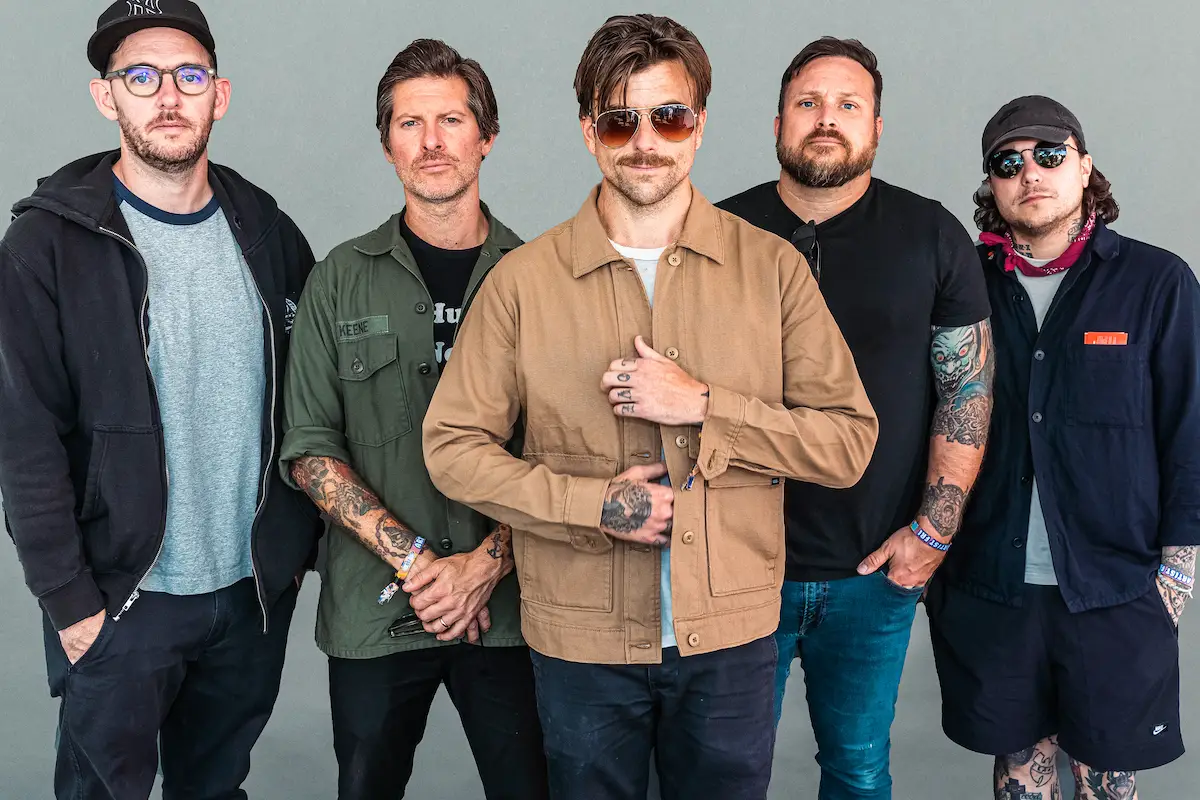
Don’t do that Frank Iero thing. Don’t do that Tucker Rule thing. Do what the song is supposed to do, and the song will navigate you.
It’s beautiful to hear. It's funny, I was thinking sometimes I ask artists, does the album reflect the live show or does the live show reflect the album? And well, you guys didn't make the album in a way that you could make it live. And yet, I feel like the album reflects the live show somehow.
Frank Iero: Isn’t that weird?
Yeah, I think that everybody here lives to play music, not to record music necessarily, which is also fun. But I think you guys live to play it.
Tucker Rule: Right before we go on stage, we always have this little meeting where we’re all walking around and we’re talking about how we’re getting possessed and like going up there to get completely satanic and spit fire. Because that’s literally how it goes. We’re the people that lose ourselves in what we’re doing. You know what I mean? There’s nothing else that matters up there than a good time and like literally just feeling it.
Frank Iero: Agreed.
Tucker, this album is admittedly pretty heavy on the drums. What are your personal favorite moments as a drummer on this record and how is playing in L.S. Dunes compared to playing with other bands of yours?
Tucker Rule: Oh man, a personal favorite of mine is “Grey Veins.” There’s a pre-chorus that Frank actually wrote and he wrote the drums for it as well. And it turned out to be my favorite thing. And again, taking the ego away from myself, having a guitar player write the drum part was like I was super excited about because it worked. I heard it and it worked. And I was like, okay, I’m going to go in the studio. I’m going to do what you gave me and I’m just going to put my drums on it, my idea on it. And it just worked. And it’s like, I don’t know, I just love that. I always think about that. It’s like when your favorite part of your record is a part that you didn’t write. That means that you love the record and you love the process and you love how it… It’s just very rewarding to have that feeling.
Frank, you’ve got an admirer.
Frank Iero: I got to tell you, my favorite part of the record is is the drums on “Past Lives.” If you notice, Tucker never goes to a crash cymbal until the second, like that very last chorus, the second half of it where it opens up. Everything on that song is close hi-hat to open hi-hat. And it’s all like that very straight, like you’re getting this, the meter of it. But then when he opens up and gets syncopated it just explodes. And it’s crazy. The amount of reserve, I guess, or like… Yeah, the ability to hold back until that last chorus of that song. Holy shit, man. It’s like, how do you do that? I don’t have that in me to not eat that last cookie or like, you know what I mean, to not…
Tucker Rule: Totally. It’s trust, man. It’s trust in your dude, just trust to know that you all don’t need me to get heavy. It’s happening. It’s happening around the whole thing. And it’s like, all right, you wanna… Let’s make this thing explode at the end. And I think that the reserve there is trusting the rest of the people in the band. Trusting that everyone’s got it and you can move around the drums. It doesn’t need to be like, “Okay, the crash cymbal means it’s heavy now.” The bass can make it heavy, the vocals can make it heavy. The lyrical content can make it heavy.
Frank Iero: I got to tell you, it took me maybe 10 listens on that song to realize that you weren’t opening up like a normal drummer would. Like you get the chorus. All right I’m gonna crash and then I’m… It’s gonna expand the sound, right? And then where do you go from 11? How do you turn up from 11 to get that last chorus over the hump? This motherf*er like it’s crazy, dude, it’s nuts. It’s nuts. Higher and like those little junkie junks. I don’t know what they’re called, like whatever.
Tucker Rule: Yeah, we had a lot of drum crap.
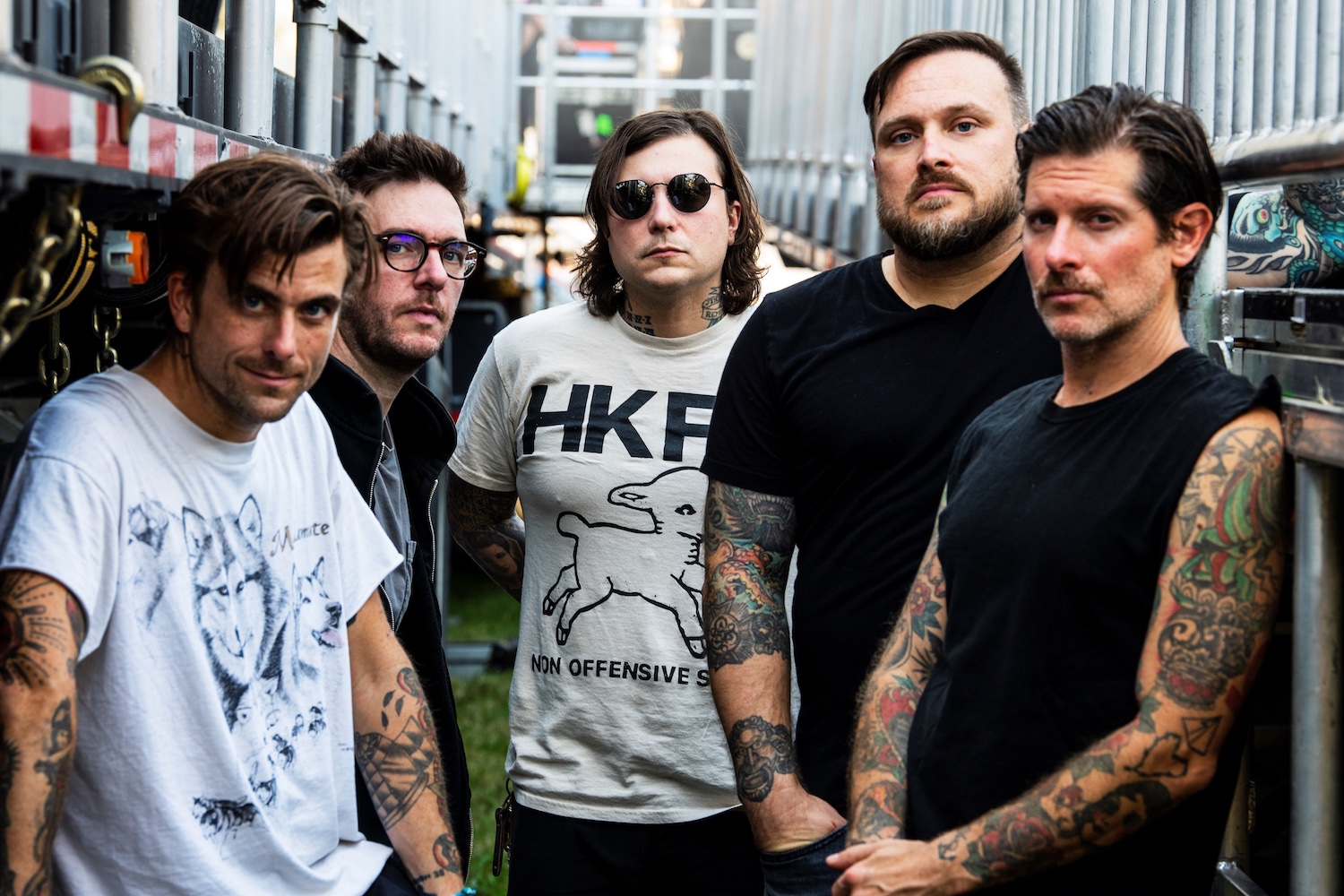
Likewise, what about Frank for guitar parts? How does playing in L.S. Dunes' compare, and what are some of your personal favorite parts to play on the record?
Frank Iero: Oh, man. I think my favorite song to play live would be maybe “It Takes Time.” Just because there’s just so much going on. I mean, this record is pretty riffy. And it really is. You can get lost in that ramen a bit. And I feel like a lesser group of guys would make a pretty shitty record with the amount of noodling happening. But I mean, kudos to Anthony, really, for being able to find a collection of melodies when there’s already so much melody happening. I mean, you have a bass player that is running around that beat. I mean it’s incredible what Tim and Tucker can do. Honestly, I feel like you could probably take all the guitars off the record and you would still be a very interesting, amazing listen if you just listen to bass and drums with Anthony on top. So I’ve always felt like for a good record or my favorite records it’s drums and vocals. The rest is kind of like it’s the cream inside the Oreo like the cookie makes it. It’s like, that is just the icing on top. So I’m going off on a tangent. I apologize. But there’s a lot of different moments on this where I feel like I took maybe some liberties or got myself out of a comfort zone. There’s a tapping part on “Grey Veins” that I never would have attempted if it wasn’t like, Oh, yeah, I’m just gonna hang out and impress my friends kind of thing.
Tucker Rule: That’s my favorite part.
Frank Iero: Thank you. So there’s there’s stuff like that. I think “It Takes Time” is one of the songs that I enjoy playing the most too, because I feel like that was like, when I finally did go in the studios, Tucker came and my friend James Bowman, who’s been teching for me. And we sat down and was like, us and Will, who produced the record. And there was a couple of parts on that song where I was like, “I don’t know if this is gonna work. I listened to the song at the hotel. And and I came up with this part last night, so I want to try it”
And that was one of those songs that was like, I had changed a lot from the demoing. It was also a moment where I had recently broken my wrist in like 10 places, right? So I felt off this ladder, it was f–ed up. And I had to have surgeries. And so I had to postpone my recording from September to December. I had my last surgery in November. So I think I may have still had like stitches and stuff like that. It was one of those things where it was like, “All right, this is a make or break moment. I don’t know if I’m able to play, but this is the only time we can do it. So I got to try.” And so that song in particular was one of those where it was like, “Hey, listen, I don’t know if this is gonna go well, but if I can do this, if I can pull this off, then I know I’ll be able to play and a lot of the anxiety that I’m feeling will be lifted.” So that was a make or break moment for me.
Tucker Rule: I don’t think anybody understands the gravity for real of the fact that like, literally, maybe two weeks before Frank went into record, he didn’t think that he was going to be able to go record, he literally had fresh stitches in and was like, celebrating small victories.
You’ve endured a lot of physical hardship in the past five years, Frank. Credit your parents for making you drink milk as a child or something.
Frank Iero: I’m lactose intolerant. [laughs] It goes back to like Tucker said, like, we come from the East Coast… It’s weird, man. The Jersey mentality is, you don’t boast about yourself. You don’t complain. You put your head down and you do the goddamn work, because nobody cares. Nobody wants to hear it and when that translates into musicianship to it’s like, there’s 1000 bands here. We all want it, so you better be really good. And nobody cares if you’re not feeling good that day. Nobody cares about whatever happened to you, because everybody’s got hard times. So get up there, shut up, and be great.
Along those lines, your debut single has stuck with me ever since I first heard it. You guys say about how much you had fun, but you also made some damn good songs. Why introduce yourselves with “Permanent Rebellion”?
Tucker Rule: As soon as I heard it with vocals on it I was like, “Shit, man, that’s crazy.” And even my wife was like, “Oh, my God, that’s so cool. That should be your first song.” And like, I always joke that my wife is such a huge barometer because she’s very hard on me musically. It’s like, “Ah, what is that?” Like very honest and brutal, straight dagger to the heart. So any bad review that could ever come out, like I don’t even care my wife’s already given it to me. So when she heard it, I was like, “Oh, you like that?” And then like the rest of the band was like, “That’s so sick.” That’s when… It was just, we didn’t really need to talk about it. It makes your hair stand up. It’s crazy.
Frank Iero: Jamia [my wife] hates everything I do. She’s not a fan of any of the music that I make. She’d be like, “Oh, that’s all right.” But like she’s not listening to that stuff. She doesn’t like it. And it keeps you humble, it does.
Tucker Rule: Yeah, they are New Jersey.
To me, so much of this album is about survival and perseverance. “I'm not afraid to try,” Anthony sings at the very top of the album. “Don't wanna fill the space with something that I'm not, chew on the iron. If I can't make it 'til 2022 at least we'll see how long I can swim.” At first I found this line really dark, but the more I thought of it, it actually feels very full of light and determination.
Frank Iero: I think it’s one of those things that when you’re at your darkest is when you can find the light. If you’re looking to get out of it. Sometimes it’s very comforting to stay in that darkness. And like when you’re sad, you want to listen to sad songs and stuff like that. Sometimes our depression is comforting. But when you finally had enough or you feel like I can’t do this if I continue on this path, it’s not going to be good and you start to look for the silver lining and things or start to look for a way out. I think that this band was a way out of that darkness and I think a lot of lyrics ended up reflecting that.
Tucker Rule: I had just had my first daughter in the pandemic. She was born in March of 2020. And that was such a bright spot. And all her firsts were such a bright spot in the pandemic, but this band was like really, really also a huge bright spot. So I think that the hopeful sound of the record, I think really is how we lived the record, how we lived making it, how we were excited to wake up and work on these parts, how we were excited to give accolades to one another for just being so excited. And I don’t think there was a day that didn’t go by that we were like, “I can’t believe we’re in this band. I can’t believe I get to do this with you guys.” Like it was truly a really, really bright spot in a dark time. And even in the brightest of times it would have been the brightest spot. I just think that it’s meant to be, it was supposed to be, and it was supposed to happen now. This couldn’t have been made five years ago. This couldn’t have been made three years ago. It had to be now.
I know that was a lifeline for you guys, but now it's taken on a life of its own. Pandemic is not over by any means, but we're back at it. Tucker, you're on tour right now. We're able to be out of it. Does L.S. Dunes' continue to be a lifeline or does it get to transition into something else now that the purpose it first served is kind of in the past, knock on wood.
Tucker Rule: I think the purpose hasn’t even been scratched yet. The surface hasn’t been scratched and the purpose is not even fully realized.
Frank Iero: I agree.
The last thing I'll say about the songs themselves, I love a massive wall of sound just like the next guy, but I have to say I fell headfirst for the closer, “Sleep Cult,” which you mentioned earlier. To me that was the song that sort of said, this band can do anything they put their minds to, anything they want, make any kind of music they want. Are there any songs that we haven't mentioned yet that you would hope that listeners really listen to or take a deeper dive into if they're just getting to know L.S. Dunes for the first time?
Frank Iero: What’s funny that you say “Sleep Cult” too, because that’s one of those songs too that I feel like ‘Live’ has even taken on just a different life, ended up creating more of an outro for it. And if one of your questions was like, “Hey, what’s your one regret or thing that you want to go back and change on the record?” It’d be like, I want to record “Sleep Cult” again so that we could get that ending in there. So I think that that though is testament to the band still being a living, breathing entity and evolving and changing and writing together. And so I love that stuff so much. As far as other songs on the record, man, it’s hard to to pick a favorite. I do feel though that “2022” is essential listening. I mean, I think it’s the perfect opener, but even if it didn’t feel like an opener I feel like it should be the first song people hear.
And I don’t mean heavy like breakdown heavy. I mean like it’s a heavy song and what he’s singing about and the way that, I mean, Tucker really started the ball rolling on getting that song to be different from Anthony’s original demo, which was just very delicate, still hauntingly beautiful. I mean, like gorgeous on its own, but it wasn’t a full band song until Tucker came in and started to play that beat behind the opening. And as soon as I heard that I knew… It forced me to do something that I’d never done before the way those chords are changing. And it’s a really special moment. It feels like… Sometimes as a musician you write something and other times it just flows through you. Just like one of those, like, I don’t know, like divine inspiration kind of things is kind of silly, but like, I truly believe that in order to be an artist you have to be in tune with the universe and allow things to kind of flow through you. And that was one of those moments where I heard the drum beat and I just started to play.
And the funny thing about that song as well is that’s the first time I played the song all the way through. That is what’s on the record. That song was recorded in my basement here in this chair, actually. So, yeah. Did I answer the question? What was the question?
Guys, this has been so much fun today. Thank you both so much for hopping on.
Frank Iero: It’s a pleasure, Mitch. Seriously.
And it sounds like the best is yet to come! What do you hope listeners take away from Past Lives, and what have you taken away from creating it and now putting it out?
Tucker Rule: I think that we’re all just really grateful. Like this is 20 years later in our careers and to have a first again is just really special. And the fact that people go out of their way to make artwork and get tattoos and all this stuff and really back a band that they had never heard a note of before. It’s just really, really special. And then I don’t know man, for me, I’m just so grateful. I literally can’t believe that I get to do this and I can’t believe I get to do it with some of my best friends. There aren’t many more words that I have.
I believe you both have your fingers on the pulse of today's music. In closing this conversation, it's been a pleasure with both of you. Who are some of your favorite artists and bands today and who are you really excited about outside of L.S. Dunes?
Frank Iero: Let’s see. Well, I had the pleasure of touring with a bunch of bands this year with My Chem. I feel like, Turnstile is killing it. The phenomenal, phenomenal band and, ‘Glow On’ is a wonderful record. So I definitely expect a lot of wonderful things from them. So psyched that they got some Grammy knobs too. Like that’s amazing. So definitely, it turns out Dilly Dally, I think is fantastic as far as like younger bands. Love playing with them. Chat Pile, oh, I love. Gosh, this is like one of those things where you go into a record store and you’ve been looking for records like for 10 years and you’re like, “Oh, shit, what am I looking for?”
Tucker Rule: Cheesecake Factory Menu.
Frank Iero: There’s a young band called Hong Kong Fuck You that I really like too. It’s a wonderful name. It really is.
Tucker Rule: I’m on tour with Cursive, right now and that band is just… They’re doing Domestica front to back and it’s ridiculous, but like Cursive is just, it’s next level.
Frank Iero: Yeah. Agreed. I remember someone for my birthday, like, this is years and years when Burst and Bloom the EP first came out, like handed me the CD and was like, “Yo, listen to this.” It changed the way I thought about music. Definitely. Hands down. They’re wonderful.
Tucker Rule: And I think Tim said it best when he said art is hard. And it really is, but it’s also so much fun.
Frank Iero: Yeah, man. But it’s that James Dean thing, right? Like you have to make it look… When it’s good it looks so easy. That’s the point. Everybody wants to be cool without trying to be cool. That’s the James Dean effect, but that shit is hard. It really is.
— —
:: stream/purchase L.S. Dunes here ::
Stream: “Permanent Rebellion” – L.S. Dunes
— — — —

Connect to L.S. Dunes on
TikTok, Facebook, Twitter, Instagram
Discover new music on Atwood Magazine
? © Luke Dickey
:: Stream L.S. Dunes ::

